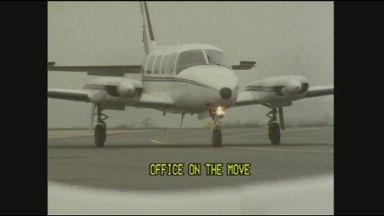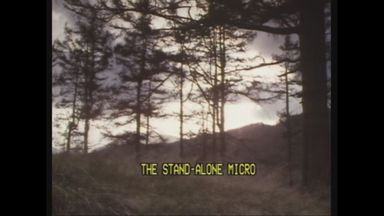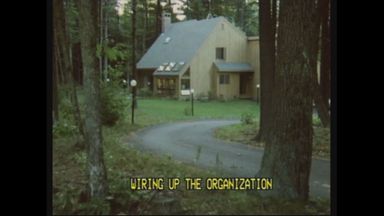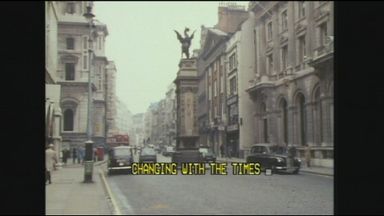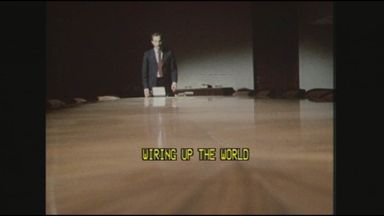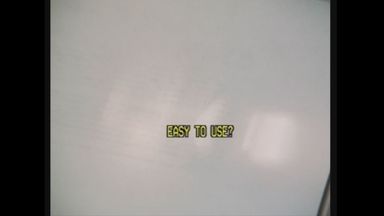Electronic Office
1. Office on the Move
Clips from this programme
Ian McNaught Davis introduces "The Electronic Office" Series and shows how he uses an office on the move, writing emails on a plane and sending and receiving them by phone when on the ground, using an acoustic coupler connected to a Tandy portable computer.
Duration: 02:03The electronic office is not about abolishing paper but about retrieving, storing and sending information more quickly and efficiently. This is evident in the New York directory enquiries centre - with good and bad things for the operators.
Duration: 02:28Sussex windsurfing is a small company using a Dragon micro to manage their books, saving data daily on a cassette tape.
Duration: 01:29Archive footage from the 1950s shows an Elliott computer data processing payroll calculations
Duration: 00:52Ian McNaught Davis discusses 'fortress data processing' in the main frame computer room of Hammersmith Borough Council and comments on the limitations of cheaper micro computers
Duration: 01:56Segas is a company using computers in its personnel (HR) department, building up data during recruitment which is used in a variety of labour-saving ways.
Duration: 02:32Ian Mc Naught Davis discusses synchronous and asynchronous communication
Duration: 04:58New techniques for communicating and integrating information systems: digital voice mail and synthesised voice systems being developed at IBM's research centre in California. Note this seems to be the voice synthesis system Stephen Hawking still uses in 2016. IBM's system is called Nine to Five.
Duration: 03:36Automation Intelligence is an American company pioneering the electronic office systems we are so used to today - including home working. All managers now type at terminals and secretaries are disappearing. Data is as valuable now as cash and needs to be kept securely. But the prospect of information overload is looming.
Duration: 05:56Peter Keen of the London Business School discusses the future of the electronic office and dismisses the idea that it will be paperless.
Duration: 01:13Electronic Office
1. Office on the Move
First broadcast: 12th April 1984
Duration 24:28
1: Office on the Move : The combination of ever cheaper computers and improved telecommunications has produced a quiet revolution on the desks of secretaries, clerks, middle managers and executives, sometimes for good, sometimes for ill. IAN MCNAUGHT-DAVIS. himself the director of a major computer company, begins a six-part examination of the office technology of today and tomorrow. Production MIKE COCKER and DAVID ALLEN
Now playing
2. The Stand-alone Micro
First broadcast: 19th April 1984
Duration 24:44
2: The Stand-alone Micro : Most of the computers in business are being used for relatively straightforward tasks like word processing, financial planning and simple data base management. IAN MCNAUGHT-DAVIS examines these various 'stand-alone' applications in the second of six programmes about the office technology of today and tomorrow. Production MIKE COCKER and DAVID ALLEN
3. Wiring up the Organisation
First broadcast: 6th May 1984
Duration 24:41
3: Wiring up the Organisation : A microcomputer on its own can perform many useful tasks in the office but as soon as an organisation starts linking computers together into a network, its whole style of working may change dramatically, with a consequent challenge to management. In the third of six programmes IAN MCNAUGHT-DAVIS continues his examination of the office technology of today and tomorrow. Film editor JOHN DlNWOODIE Production MIKE COCKER and DAVID ALLEN
4. Changing with the Times
First broadcast: 10th May 1984
Duration 23:45
4: Changing with the Times How do modern electronic methods affect the working habits and culture of an old established daily newspaper? IAN MCNAUGHT-DAVIS finds out with the help of journalists, editors and others at the New York Times. Film editor JOHN DINWOODIE Production MIKE COCKER and DAVID ALLEN
5. Wiring up the World
First broadcast: 17th May 1984
Duration 24:25
5: Wiring up the World : The microcomputing revolution in business would mean little without the telephone network. Companies can exchange data electronically with each other and even with us, their customers, in a fraction of a second, and this is having a considerable effect on competition. Production MIKE COCKER and DAVID ALLEN
6. Easy to Use?
First broadcast: 24th May 1984
Duration 24:32
6: Easy to Use? : Computer manufacturers at present claim 'ease of use' for their machines. In reality most computers are far from easy to use. In this last programme IAN MCNAUGHT-DAVIS takes a look at some of the work being done to humanise the technology. Production MIKE COCKER and DAVID ALLEN












